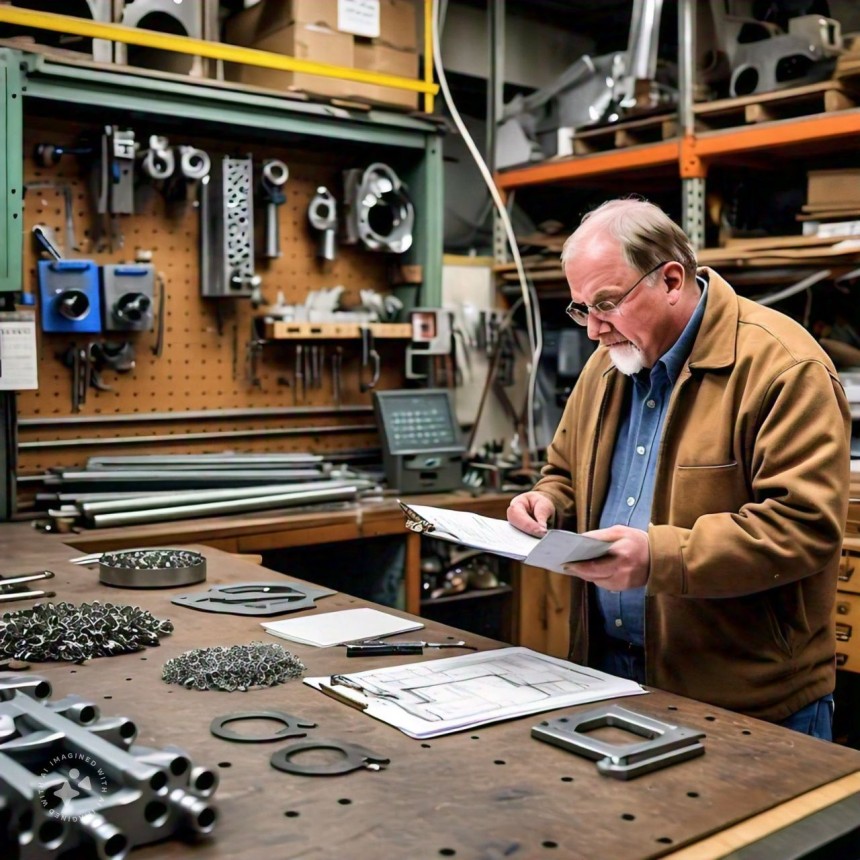How Do You Select the Right Materials for Custom Parts Manufacturing?
Material selection is one of the key things in custom parts manufacturing with an understanding of mechanical properties. Tensile strength is the resistance of an object to breaking under tension.
Custom Parts Manufacturing is the basis of any industry, whether it be the automotive industry or the aerospace industry. The right material choice for custom parts plays a crucial role in performance and cost; performance, durability, and cost can be directly effective. There are numerous important aspects that have to be considered in making a proper choice of materials for custom parts. This paper identifies the most important of these aspects and suggests guidance to support your decision.
Understanding of material properties
Mechanical Properties
So, material selection is one of the key things in custom parts manufacturing with an understanding of mechanical properties. Tensile strength is the resistance of an object to breaking under tension. Hardness is the resistance of a material to deformation, and ductility measures a material's ability to be changed in shape without breaking. Say, for example, you're into custom gasket manufacturing; then, materials like rubber/silicone facilitate the purpose due to their flexibility and sealing ability.
Thermal Properties
The thermal properties become very important, too. It includes not only thermal conductivity but also expansion. Thermal conductivity measures the degree to which a material conducts heat. Thermal expansion refers to how much a material expands when it is heated. For example, in manufacturing metal shims, you would want materials to resist high temperatures without being deformed or losing their integrity. It is for this very reason that metals such as stainless steel or aluminum are chosen to be used on such applications because of their stable thermal properties.
Chemical Properties
Chemical resistance is a very crucial factor, especially where the parts operate in environments having corrosive chemicals. The materials should be able to bear the chemical attack without degradation. The selection of materials with high chemical resistance, such as special plastics and coated metals, is done to Custom Parts Manufacturing where the parts are prone to exposure to chemicals.
Material Types for Custom Parts
Metals
Basically, metals find their application in custom parts manufacturing because of the strength and durability factor that it possesses. The most popular metals for such applications are steel, aluminum, and titanium, each of which enjoys certain benefits. Stainless steel, for example, has features that make it a favorite for the Machine parts manufacturing as it is resistant to corrosion and strong. Titanium, due to its cost, is very high in the strength-to-weight ratio and hence finds uses in highly specialized industries.
Plastics
Composites are also popular for custom parts, especially when lightweight or cost-effective solutions are required. Polycarbonate, nylon, and PTFE materials have a number of material properties appropriate for use in different applications. Custom gaskets are created with a range of plastic materials, like silicone or neoprene, due to their sealing and flexibility properties.
Composites
Composites allow for the joining of several materials' strengths. Carbon fiber composites have very high strength-to-weight ratios and are currently used in aerospace and high-performance automotive parts. The properties of the composites can be controlled to meet the requirements of the application; thus, Custom Parts Manufacturing with various properties is best served by these methods.
Factors Affecting Material Choice
Application
Material selection also depends on the application of the custom parts. If the parts are to be exposed to extreme temperatures, then high thermal stability materials have to be used. In the manufacture of metal shims, the materials to be used must be such that they can withstand pressures and temperatures that vary widely. Knowing what the application requires makes it easier to limit the type of materials to select.
Cost Considerations
No matter what, cost is always involved in manufacturing. While the new performance materials may provide significantly improved properties, there is almost always a cost for them. It becomes essential to weigh the cost of a material against the performance requirements for these custom parts. Many times, for standard product manufacturing, a lower-cost material is used which still fulfills the original performance requirements, just to keep the manufacturing process within a marginal cost.
Manufacturing Process
Different materials may be more appropriate for different manufacturing processes. Some are easier for machining than others, while some require special tools and equipment. In Machine parts manufacturing, specifically, the materials to be used should be compatible with the intended methods of production to guarantee a balance between efficiency and cost-effectiveness.
Material Selection Best Practices
Work with Experts
You will also be able to make good connections with material scientists and engineers to understand the best materials that can be used for fabricating your custom parts. They will be able to suggest a solution based on your need and guide you through their vast knowledge of material properties and manufacturing processes.
Test and Validate
Materials should be tested for their performance and validated before being finally chosen for use. With the help of material prototyping and testing in real-life conditions, all probable problems come into the light before using the material; the requirements for performace are met perfectly by using the right material. For example, in the case of the manufacturing of custom gaskets the testing the material under different conditions will prevent any future problem with sealing performance.
Consider Green Factors
Environmental awareness has become very paramount in today's world. Some of the material selection for Custom Parts Manufacturing would, therefore, have to consider those with reduced environmental impacts, for example, being recyclable or reduced carbon footprint materials, which will align with sustainability goals.
Conclusion
Material selection in the Custom Parts Manufacturing is a multi-factor process. Some of the factors that need to be considered therein include mechanical, thermal, and chemical properties, among others. Alongside an understanding of the specific needs of your application and collaboration with experts, you will be able to balance well the decisions between performance, cost, and environment. Whether in the making of a custom gasket, metal shim manufacturing, or in the making of any other custom part at a certified machine shop in UAE, the selection of the right material is very vital in deriving the desired result.
FAQ’s
Which aspects should I consider, considering the choice of materials for custom parts manufacturing?
Consider mechanical properties, e.g., strength and hardness, in terms of thermal and chemical properties, such as conductivity and expansion, or resistance to corrosion. Consider the application requirements against which the parts will be checked, together with cost and manufacturing processes involved.
How do I choose between metals and plastics for custom parts?
A note on the choice: the choice will depend on the requirements of your application. Metals are usually chosen for their strength and durability, and plastics turn out to be the preferred materials in case of weight minimization or low cost. Consider performance requirements and budget while deciding.
Why is it important to test a material before finally deciding on it?
It is important, then, through material testing, that they perform the way they are expected and be very strong to confront in real-use conditions. In this manner, it helps to detect problems, if any, from the early stages itself and thus saves money and time.
How can I ensure that the materials I choose are environmentally friendly?
Search for materials that can be recyclable or have lesser carbon footprints. Collaboration with responsible suppliers and understanding the lifecycle effect of materials will enormously assist in making green/materials decisions.
Can collaboration with material experts help in the selection of the right materials?
Yes, teaming up with material scientists or engineers might provide you with valuable insights and recommendations based on your requirements. Their expertise can be used to assist in the choice of materials for your customized parts.





